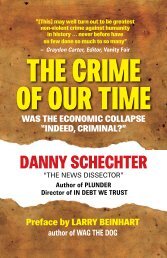UPDATED - ColdType
UPDATED - ColdType
UPDATED - ColdType
- TAGS
- updated
- coldtype
- coldtype.net
Create successful ePaper yourself
Turn your PDF publications into a flip-book with our unique Google optimized e-Paper software.
The moral universe<br />
of Thomas Friedman<br />
EMBEDDED: WEAPONS OF MASS DECEPTION<br />
“AMERICA did the right thing here,” argued<br />
Thomas L. Friedman, minister of conventional<br />
wisdom, on The NY Times Op-ed page yesterday.<br />
“It toppled one of the most evil regimes on<br />
earth.” And so a new rationale of the war is<br />
emerging post-hoc, picturing the Bush Administration<br />
as human rights avengers, “globo-cops”<br />
out to right wrongs. Friedman uses a skull of one<br />
of Saddam’s many victims as a symbol of why the<br />
war was worth it. I read that with a certain<br />
degree of mirth because as every serious student<br />
of U.S. human rights policy knows Washington’s<br />
stance on human rights is selective,<br />
guided by perceived U.S. interests, not morality.<br />
Isn’t it interesting how Saddam’s crimes are<br />
being splashed across our TV screens now, but<br />
so many others in so many countries, over so<br />
many years were ignored, or criticized without<br />
commitment to action. Today, while the Bush<br />
Administration points to human rights abuses in<br />
Iraq, it will not support an International Criminal<br />
Court to try offenders. Talk of human rights<br />
abuses in the U.S. is verboten.<br />
Thomas Friedman waffled for weeks about the<br />
justification for going to war with Iraq. Now that<br />
war has been “won” he is out front supporting it<br />
as a humanitarian intervention. Come on. Last<br />
week Philip Weiss skewered Friedman’s pretensions<br />
in The NY Observer. This week, some letter<br />
writers speak about this self-described liberal<br />
with a clarity that bears repeating.<br />
Cathryn Carrol of Annapolis writes, “If people<br />
wrote about blacks, the way he writes about<br />
Arabs, he metaphorically (and justifiably) would<br />
be drawn and quartered.” She also lambastes<br />
224<br />
Friedman’s certainty, his sanctimonious insight,<br />
and his pseudo-depth.<br />
Jim Furlong of Connecticut takes on his core<br />
ideas: “democracy and love of capitalism flow<br />
from the barrel of a gun: that seems to be our<br />
new idea. It is a variant of the idea that the ends<br />
justify means.” Henry Bright of Florida charges<br />
that Friedman “has become an intellectual captive<br />
of the people he admires: the titans of industry<br />
and globalization.”<br />
Remember Cambodia<br />
FRIEDMAN holds up the skulls of Saddam’s victims<br />
as reason enough for the intervention. I<br />
wonder if he remembers the Vietnamese invasion<br />
of Cambodia to topple the genocidal Khmer<br />
Rouge who piled up many more skulls that Saddam<br />
ever did. That invasion was condemned by<br />
all the policy wonks in the U.S.. Washington later<br />
supported the killers, not those liberators. But<br />
then again, there was no huge supply of oil in<br />
Cambodia.<br />
I was talking the other day with a Falun Gong<br />
practitioner who reminded me that 50,000 of her<br />
fellow non-violent colleagues are in jail, many<br />
tortured or dead, thrown out of buildings and<br />
trains. Have we heard a peep about that? We do<br />
business with China and so can pragmatically<br />
overlook their treatment of Tibetans or prodemocracy<br />
activists.<br />
You need a comment from Saddam<br />
I WAS reminded also of a personal experience.<br />
Along with my colleagues here at Globalvision,<br />
we produced a special on human rights, which<br />
included a segment on Saddam’s gassing of the

















